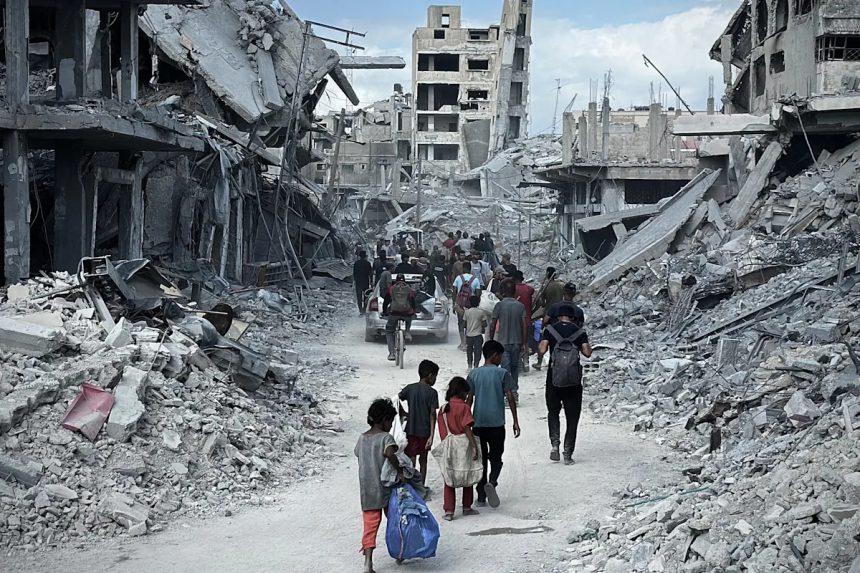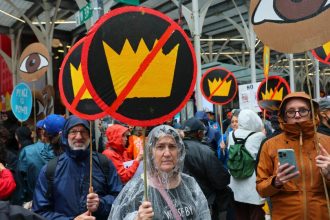Sign up for the Slatest to get the most insightful analysis, criticism, and advice out there, delivered to your inbox daily.
Hamas has ruled Gaza since 2007. Now, for the first time, its hold on power feels as if it may be nearing an end. This fall’s ceasefire is part of Donald Trump’s broader peace plan that calls for phasing out Hamas’ control of Gaza in which power in Gaza would first go to a temporary governing body, before eventually going to the Palestinian Authority—the body that governs in the West Bank.
It’s unclear if any of this will come to pass. The ceasefire is extremely fragile: Israel killed more than 100 people in Gaza in strikes late last month, according to Gaza’s health authorities. The killings followed gunmen’s killing of an Israeli soldier in Gaza, according to the Israeli government.
But even if some semblance of a ceasefire holds going forward, there’s a chasm between a peace plan calling for Hamas’ exit and it actually happening: Israel says Hamas must disarm or risk collapse of the truce. Hamas insists that it accepts the ceasefire phase but that to transition out of power in Gaza, it cannot yet commit to an immediate disarmament.
Still, amid the ceasefire and peace plan, I wondered what Gaza would look like if Hamas’ nearly two decades in power came to a close. So I called Tareq Baconi, the author of Hamas Contained: The Rise and Pacification of Palestinian Resistance and the new memoir Fire in Every Direction, as well as the president of the board at Palestinian Policy think tank Al Shabaka. But the interview took a rapid detour when I asked Baconi about Gaza after Hamas. I was, he argued, asking the wrong question.
First, he says, it’s extremely unlikely to happen: “I don’t think there’s really a prospect for Palestinians without Hamas—not just for Gaza without Hamas—because Hamas isn’t an entity that can be completely destroyed or removed,” he said. Even if it were to be officially dismantled, he says, its networks would remain.
And beyond that, he says, focusing solely on Hamas’ disarmament and accountability ignores what has just happened: the Israeli government’s perpetration of what Baconi—like many conflict experts and scholars—considers a genocide. The implicit assumption is that Israeli Prime Minister Benjamin Netanyahu, who is wanted for war crimes by the International Criminal Court, gets to continue governing without facing any consequences. “What we’re effectively saying is, ‘This regime can carry out mass extermination with impunity. Let them finish, and then we’ll figure out how to make life sustainable under that same regime,’ ” Baconi said. “That can’t be the entry point.”
Within the current U.S. power structure, Baconi’s arguments are controversial. But to him, they’re ultimately grounded in a fundamental truth: Palestinians have the right to a safe, secure future in which they’re not a people suspended in statelessness and at the mercy of the Israeli regime.
We talked about Gaza’s future, the problems with the current ceasefire, and Baconi’s personal experience as a Palestinian. This interview has been edited and condensed for clarity.
Aymann Ismail: Before we begin, because you’re Palestinian, I wanted to be sensitive to the massive loss of life and start with something personal. How have you been holding up through the past two years?
Tareq Baconi: For those of us in the diaspora, it’s a mix of rage and powerlessness, and then moments of mania, energy, and adrenaline. It’s been a very difficult two years to manage. Watching this from afar and feeling helpless to stop it is crushing, and that has a deep impact. But it’s nothing compared to what people are feeling in Gaza—and [Palestinian citizens of Israel] and the West Bank, where there are other forms of repression.
Let’s start with how you became interested in Hamas’ operations and origins and what led you to write the book that’s now widely considered a foundational text in the West for understanding Hamas.
I like to say I studied Hamas as a way of understanding Palestine more broadly. Growing up in Amman, I didn’t really study Palestine or our own history. Our educational systems do an abysmal job teaching us our politics and past. So it became a way to learn about Palestine itself. It wasn’t specifically about Hamas at first, but the research naturally evolved in that direction.
It feels as if the world is beginning to imagine what Gaza might look like without Hamas. Have you given that prospect any thought?
I don’t think there’s really a prospect for Palestinians without Hamas—not just for Gaza without Hamas—because Hamas isn’t an entity that can be completely destroyed or removed. I don’t really know what it means when we say “a Gaza without Hamas.”
The closest example would actually be the West Bank, where Hamas as a party was completely dismantled. Many of its members were imprisoned by both the Palestinian Authority and Israel, and much of its infrastructure went underground. But that didn’t mean that Hamas disappeared. There are still people who adhere to armed resistance, who are Islamist, or both, and there are many who simply support the idea of armed resistance against the apartheid regime.
Hamas as an organization might disappear, but its ideological formation—that there is a right to resist using arms, and sometimes through an Islamist framework—will always exist, and it will surface in different manifestations. The most recent example in the West Bank is the Lions’ Den in Nablus and Tulkarem. I imagine that’s closer to what a “future Gaza” without Hamas would look like.
But I also think the question itself is a red herring. It places the emphasis on Hamas—“How can we destroy Hamas so we can return to a functional Gaza?”—and that deflects from the real issue: Palestinians have a right to resist. Even if Hamas didn’t exist, Israel would still maintain the blockade and the occupation, just as it has all along.
As we try to imagine the next phase of this conflict, Israel has signaled that it is still very far away from recognizing a Palestinian state on its border. It has also made clear that Hamas must be demilitarized in the very near future or else the bombing will resume. What are the chances of that actually happening with a group like Hamas laying down its arms at a moment like this?
It’s not unimaginable, given the degree of brutalization Israel has carried out in this genocide, but still, I find it unlikely, and I’d be very surprised to see Hamas laying down its arms. Any responsible movement would weigh its broader right to exist and its ideological commitment to liberation against the extreme suffering happening now. But disarming would mean more than just losing political or military power. It would signal a defeat that extends beyond Hamas and to the Palestinian people as a whole.
Again, I think it’s a red herring. Even if Hamas were to disarm, other organizations that remain committed to resistance would emerge. It’s deeply misguided to focus on disarmament while the cause of oppression remains unchallenged.
So if “Will Hamas disarm?” is the wrong question to be asking right now, what is the question we should be asking?
We should be asking about accountability. The world just witnessed a livestreamed genocide, and the head of the Israeli government is wanted for war crimes by the International Criminal Court. How can we talk about the day after without any effort toward justice? What we’re effectively saying is, “This regime can carry out mass extermination with impunity. Let them finish, and then we’ll figure out how to make life sustainable under that same regime.” That can’t be the entry point.
How are we talking about “the day after” when the “day before”—Oct. 6—Palestinians were living under apartheid, being killed daily with no recourse to justice? If we want to talk meaningfully about what comes next, we have to start with justice and accountability. We can’t unsee the genocide or pretend that it’s somehow moved us to a point where we can start imagining a political future without taking stock of this moment.
If we turn inward and look at Palestinians themselves, there’s also a reckoning ahead. Our leadership—which of course includes Hamas—failed to prevent the genocide and failed to protect Palestinians from Israel’s most brutal aggression. The real question now is: Is the Palestinian struggle limited to achieving truncated autonomy under Israeli apartheid? Or is it still about full decolonization? If it’s the latter, the question of how we move forward from here is a question Hamas has to be part of—but it’s not for Hamas alone to answer.
One thing that always stuck out to me in your book was that Hamas seemed almost flabbergasted to find itself in charge of governing Gaza after its election win. Hamas didn’t organize around governance but was suddenly given the reins to lead. Could that history inform what happens next?
When Hamas ran in the elections, it understood that the Palestinian Authority was a deeply problematic institution born out of the Oslo Accords that shifted Palestinians from a path of liberation to one of state-building. It knew the risks of engaging politically within a framework designed to manage the occupation rather than end it. But, as I say in my book, I think Hamas naively thought that once it was in the system, it could revolutionize the system. In that vision, the PA would essentially become the embryo of liberation, rather than an entity complicit with occupation.
Very quickly after, though, it was clear there was massive international opposition to that plan. In hindsight, that seems obvious, but at the time Hamas had a different reading. It ended up encumbered by governance in Gaza, American and Israeli intervention, a civil war with Fatah, and internecine violence. Hamas ultimately became contained within Gaza, governing almost despite itself, suddenly responsible for 2 million Palestinians while lacking control over borders or what came in and out of the strip. It was a difficult position to be in.
For the next 13 years—and we now understand Oct. 7 as the end of that period—Hamas tried to balance its role as a governing authority with its revolutionary potential. It would fire missiles whenever the blockade became too strict, using that as leverage to negotiate limited relief. It balanced those dual responsibilities of governance and resistance, all while quietly building its military capabilities.
I should also say that during this time the movement experimented with other forms of resistance, many of which were unarmed and peaceful, and all of which were met with complete brutality.
In the latest deal, in which Trump declared he’s “delivered peace to the Middle East,” one of the terms is that Hamas will no longer have a role in Gaza’s governance and will lay down its weapons in exchange for an international peacekeeping force to stabilize and rebuild the strip. Hamas has preliminarily agreed to those terms, but as Phase 1 drags on, the Israeli government has accused Hamas of buying time and said that it has no real interest in being sidelined in this way. Do you have thoughts on whether Hamas could be sincere about delivering on this promise?
Let’s take it out of the Hamas context for a second and talk about the plan itself. The plan is a terrible plan. Yes, it includes a ceasefire, which is urgently needed for Palestinians, but it couches that within the framework of Palestinian submission. The ceasefire goes into effect, Israeli forces withdraw, and Palestinians are stripped of any real rights to govern their future.
No Palestinian faction, Hamas or otherwise, could have unreservedly accepted that plan. Hamas was put in an impossible position: reject it and give Israel an excuse to continue the genocide, or accept it and risk signaling Palestinian defeat. So I think the movement made a smart choice. It accepted the first phase securing the ceasefire but made clear that all other phases, including disarmament, governance, and reconstruction, must be determined collectively by Palestinians, not Hamas alone.









